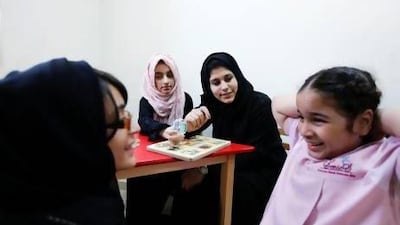DUBAI // School's out for the winter break, but 15-year-old Azza Al Juwaied is still learning.
The Emirati pupil and 27 of her peers at Dubai Women's College High School chose to give up part of their holiday time to learn the ropes in the workplace this month.
The teenagers are shadowing employees for a week at organisations including Emirates Airline, Dubai Customs and Senses Care Home to gain communication and teamwork skills and better understand their career options.
The programme - Amali Watani, meaning "my work is my country" - was launched by the school as a remedy to the skills-mismatch young people can face when they enter the job market.
"My first lesson was definitely that of patience," said Azza, who last week started work at Senses, a centre for people with special needs.
Eighteen pupils were assigned to classes training people how to assist special-needs children and their parents.
"I did not know each child requires a different approach," said Azza, who plans make a career in medicine. "I also wanted to do this because I have a sister with special needs, and later on I would like to open my own centre."
Maya Al Hawary, the principal of Dubai Women's College High School, believes it is necessary to familiarise young pupils with the work environment. "It's very different from what they learn in a classroom," said Ms Al Hawary. "When exposed to a job setting they become responsible and start taking instructions seriously."
The high school at Dubai Women's College is the first to introduce an education model with a mix of online courses and face-to-face sessions.
"The whole idea was for them to understand different aspects of a job, like finance, HR and customer service," Ms Al Hawary said. She said it would also help them make clear career choices for the future.
A McKinsey & Co report, out this month, says an absence of soft skills among youth, such as a good work ethic, teamwork and communications, is contributing to their unemployment situation.
Its study, which covered nine countries, found young people consider on-the-job training the most effective instruction technique.
Unemployment is a growing concern in the Middle East as the number of jobless youth has grown to more than 25 per cent. According to figures complied by the Federal National Council, one in five Emiratis was unemployed last year.
There are several individual efforts by UAE-based institutions to provide work experience to pupils but a coherent effort that links schools to employers is still missing.
Countries that do have a system in place have reduced unemployment. In France, students who went through an apprenticeship were 6.5 per cent more likely to be employed after three years and earned 2.9 per cent higher salaries. Cooperation between schools and employers in Japan has helped place school graduates directly into jobs.
Pupils at DWC High School will have to prepare a report at the end of their training. They also have to post regular updates and photographs on the school website.
Ms Al Hawary said the programme had to be well structured to map its success. "Employers have also been given internship forms to fill out, assessing each pupils performance," she said.
Afra Saeed Al Muhairi, whose daughter will be in a group of 13 working at Emirates Airline from Sunday, said she was glad such a programme was in place.
"I want her to get a taste of the work environment," Mrs Al Muhairi said. "She should know now what to expect and the commitments of a job."

